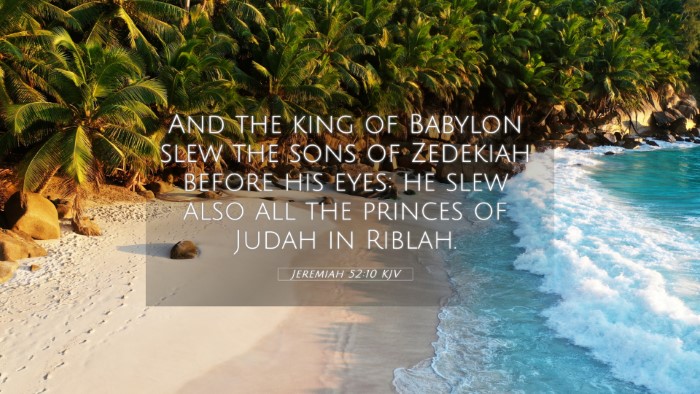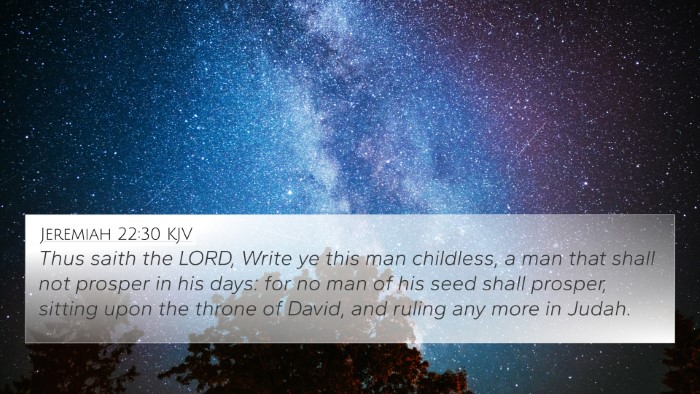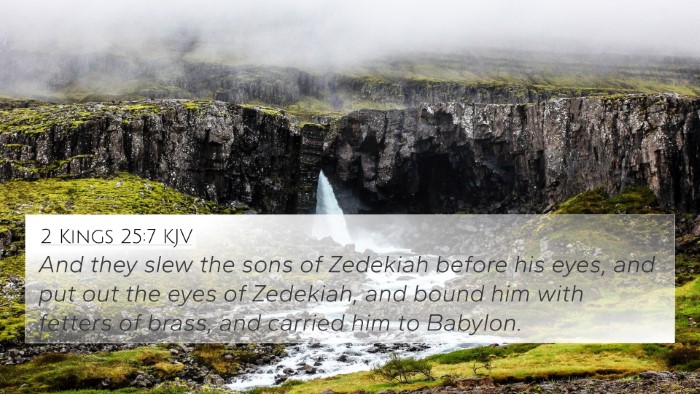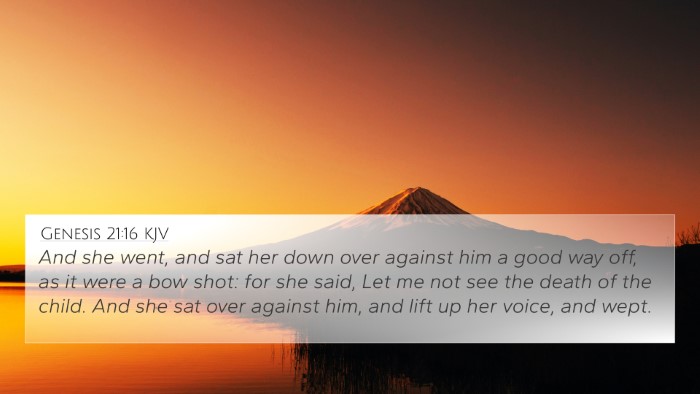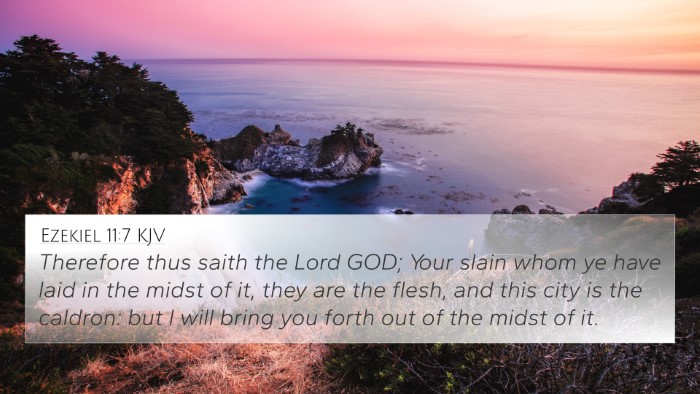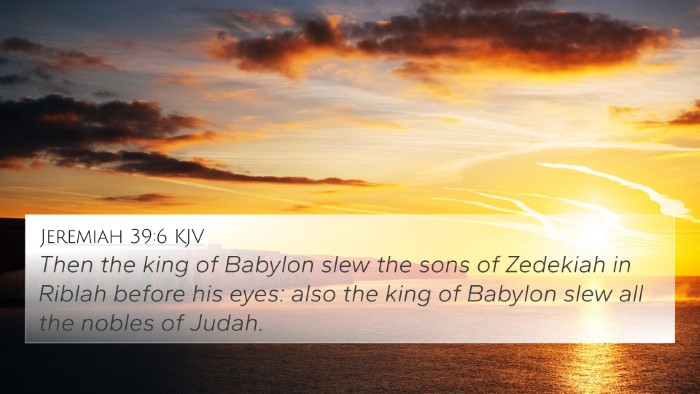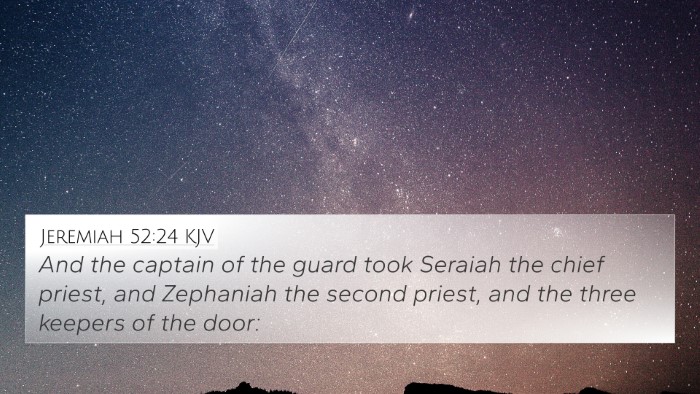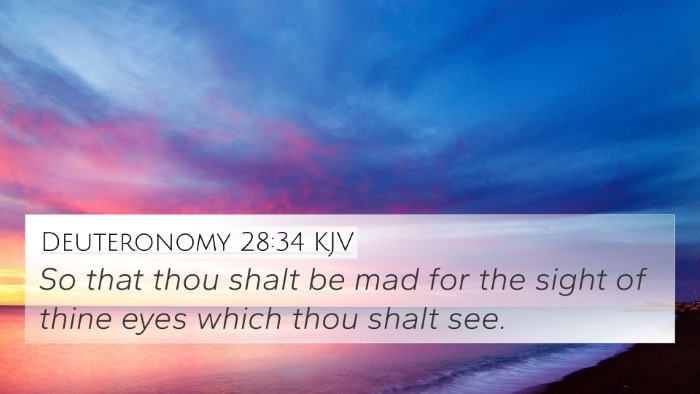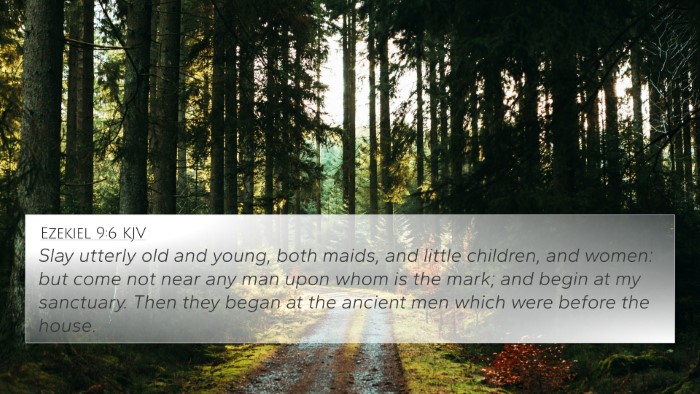Understanding Jeremiah 52:10
Jeremiah 52:10 states: "And the king of Babylon slew the sons of Zedekiah before his eyes: he slew also all the princes of Judah in Riblah." This verse serves as a poignant conclusion to the tragic narrative of Jerusalem's fall and illustrates the dire consequences of disobedience to God.
This verse emphasizes two primary themes:
- The Judgment of God: The executions represent divine judgment against Judah for their persistent rebellion.
- The Tragic Consequences of Leadership Failure: Zedekiah's choices resulted in severe repercussions for both himself and his people.
Commentary Insights
Matthew Henry reflects on the gravity of Zedekiah’s punishment. He notes that witnessing the death of his own sons adds an unbearable level of humiliation and sorrow to Zedekiah's fate. This serves as a reminder that God’s punishments can be both physical and emotional.
Albert Barnes highlights the significance of Riblah, noting that it was here that Zedekiah faced the Babylonian king and where God’s judgment was executed upon him and his rulers. This illustrates how God’s plans prevail over human resistance and rebellion.
Adam Clarke discusses the historical context of this event, noting it reflects the larger narrative of Israel’s downfall due to idolatry and unfaithfulness to their covenant with God. Zedekiah's actions, or lack thereof, symbolically reflect the choices of Israel as a whole.
Cross References
This verse can be cross-referenced with the following biblical texts, which share similar themes of judgment, leadership failure, and the consequences of disobedience:
- 2 Kings 25:7: "And they slew the sons of Zedekiah before his eyes, and put out the eyes of Zedekiah..." - highlights the same event as described in Jeremiah 52:10.
- Jeremiah 39:6-7: "Then the king of Babylon slew the sons of Zedekiah in Riblah..." - provides parallel details emphasizing God’s judgment.
- Ezekiel 12:13: "My net also will I spread upon him, and he shall be taken in my snare..." - prophesies about Zedekiah's fate, reinforcing the theme of judgment.
- Zechariah 7:9-10: "Thus speaketh the LORD of hosts, saying, Execute true judgment..." - underlines God’s desire for justice and faithfulness.
- Lamentations 2:20: "Behold, O LORD, and consider to whom thou hast done this..." - expresses the communal lament of Jerusalem's destruction.
- Matthew 27:25: "Then answered all the people, and said, His blood be on us, and on our children." - reflects similar themes of judgment and its generational consequences.
- Romans 2:6-8: "Who will render to every man according to his deeds..." - emphasizes divine retribution and accountability.
- Revelation 20:12: "And I saw the dead, small and great, stand before God; and the books were opened..." - speaks to the ultimate judgment that all will face.
- Proverbs 14:34: "Righteousness exalteth a nation: but sin is a reproach to any people." - connects moral choices with national consequences.
Thematic Connections
This verse, alongside its cross-references, facilitates deeper understanding through thematic connections across the Bible.
- Covenant Faithfulness: A recurring theme throughout the Bible, emphasizing obedience to God as paramount.
- Divine Judgment: Seen from Genesis to Revelation, showing that God's holiness necessitates judgment against sin.
- Leadership Accountability: Leaders are responsible for the spiritual direction of their people, as demonstrated in the downfall of Zedekiah.
Tools for Bible Cross-Referencing
To explore these connections further, various tools and resources can aid in cross-referencing Biblical texts:
- Bible Concordance: A helpful resource for finding specific verses and their references.
- Bible Cross-Reference Guide: Offers structured connections between verses, facilitating comparative studies.
- Cross-Reference Bible Study: Techniques that emphasize linking scriptures for comprehensive understanding.
- Bible Reference Resources: Books or digital tools designed for in-depth biblical research.
Conclusion
Jeremiah 52:10 serves not only as a historical account but as a profound reminder about the consequences of disobedience, the importance of faithfulness to God, and the accountability that leaders carry for their decisions. The surrounding commentaries and cross-referenced scriptures enrich our understanding, demonstrating the interconnectedness of biblical themes and the necessity of using tools for effective Bible study.

